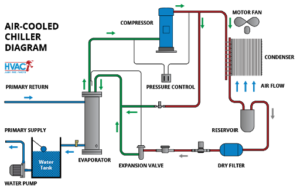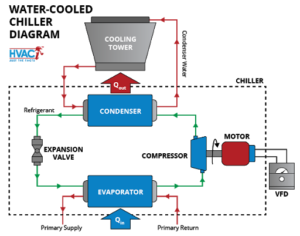What is a Chiller System?
A chiller is a large piece of machinery part of Heating, Ventilation and Air Conditioning (HVAC) systems. This equipment uses vapor-compression to cool water that is then used to cool products and machinery, and dehumidify and chill a building.
This HVAC component is vital for any commercial facilities, including hotels, restaurants, hospitals, sporting arenas, industrial and manufacturing plants, and more. Chillers are usually used in these types of buildings since large groups of people are constantly flowing through, increasing the average temperature. In order to mitigate the heat, chillers act as a refrigerant to transfer heat from an internal environment to an external environment.
Regardless of your industry and process, chillers are essential for temperature regulation, and therefore critical to productivity and cost savings.


How does a Chiller work?
Chillers work through a cooling process known as the refrigeration cycle. There are four steps to this process:
- Evaporate: The process starts with a low-pressure refrigerant entering the evaporator where it is heated and changed into a gas phase.
- Compress: The refrigerant that is now a gas goes into the compressor to increase its pressure.
- Condense: Using cooling water from a cooling tower or the surrounding air, the high-pressure refrigerant loses its heat and is condensed into a high-pressure liquid.
- Expand: The high-pressured liquid enters the expansion unit which has a metering device that limits the flow of refrigerant in the system. This lowers the pressure allowing the cooling process to start again.
Two Types of Chillers: Air-Cooled VS. Water-Cooled
| PARAMETERS | WATER-COOLED CHILLER | AIR-COOLED CHILLER |
| Size | Smaller | Larger |
| Lifespan | Longer | Shorter |
| Efficiency | Higher | Lower |
| Best Location | Indoors | Outdoors |
| Desired Temperature
Environment |
High temperature
environments |
Low temperature
environments |
| Water Consumption | High | Low |
| Environmental Concerns | Higher | Lower |
| Initial Costs | Low | Low |
| Operating Costs | High | High |
| Maintenance | High | Low |
| Seasonal de-rating | Low | High |
| Heat Rejection Devices | Cooling towers | Dry condensers with direct condensation |
| Chemical Consumption | Yes | Zero |
Which do you choose?
Uncertain on which chiller is best for you and your environment? Let our HVAC engineering experts guide you to the right choice. We want to make sure your equipment is efficient–saving you time, money, and stress.
Give your local TemperaturePro a call or check out their website today to learn more!









